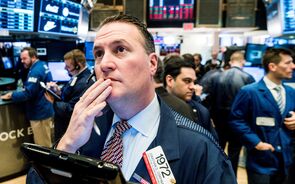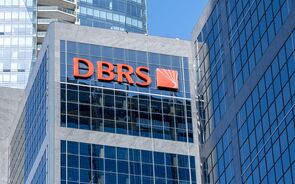Ulisses, podias por este ...?
3 mensagens
|Página 1 de 1
Aqui fica.
Um abraço,
Ulisses
"The Profitable Hobby of Warren Buffett"
By James Altucher
Special to RealMoney.com
7/6/2004 12:30 PM EDT
"Yesterday, a little-noticed event took place, and it wasn't even mentioned in the financial media. A small, $11 million market-cap, over-the-counter company called Laser Mortgage (LSMM:OTC BB) announced that stockholders of record as of July 5 would receive a dividend of 86 cents per share. The stock closed at 84 cents Friday. This distribution represents the dissolution of the company.
Why is this interesting? Over the past several years, one of the company's largest shareholders was Warren Buffett. No, not Berkshire Hathaway (BRKA:NYSE - commentary - research), but Buffett in one of the few dalliances he takes with his personal portfolio.
Although it represents only a small portion of Buffett's overall net worth (0.25%, according to him), his personal portfolio over the past 10 years sheds some interesting light on his views on investing. With more than $30 billion that needs to be put to work, Berkshire Hathaway is too big for Buffett to get into the type of situations he loved when he was running his hedge fund from 1957 to 1969.
These "Workout" situations, as Buffett called them at the time, often represented up to 50% of the profits in his fund, depending on the year, and were heavily influenced by the writings and teachings of Buffett's mentor Ben Graham. In most cases, they were small companies, trading below liquidation value, or where Buffett thought liquidation was in the works or, in some cases, had already been announced. When Buffett expanded his repertoire to buying growing companies above their breakup value, he likened the Graham-Dodd approach to buying "cigar butts -- you can pick them off the ground and smoke one more puff, but that's about it."
I'll take a look at a few trades in his personal portfolio over the past decade. For all of these trades, it's impossible to know all of the details because Buffett never discusses them and is only obligated to file his ownership when it exceeds 5% of the company. However, we can still pick through the SEC filings and news reports on the companies and try to examine what happened, when and why.
Laser Mortgage
This company was a mortgage-backed real estate investment trust that quickly got into trouble in 1999 and 2000 when interest rates spiked up. It used heavy leverage and made very concentrated bets that backfired horribly when mortgage lenders defaulted, causing it to mark down book value significantly.
Because of these defaults and markdowns, investors lost faith in management's ability to value its portfolio correctly, and the stock soon plunged below book value. In October 2000, management threw up its hands and announced it was looking into a possible liquidation of its portfolio and ultimate distribution of proceeds to shareholders.
Buffett began acquiring stock most likely in early 2000, when the stock was trading around $4 and book value was around $4.51. On April 13, 2001, Buffett filed a Schedule 13G with the SEC stating that he owned 979,000 shares, or about 6.98% of the company.
On April 25, 2001, Laser's board of directors approved the liquidation and dissolution of the company, immediately approving an initial distribution of $3 per share. In 2003, it made another distribution of 50 cents, and yesterday, holders of the stock became entitled to the final 86-cent distribution. I'm not sure when -- or if -- Buffett exited the stock.
JDN Realty
This REIT owned 15 million square feet of shopping centers. The company attempted to anchor each of its shopping centers with a "value" tenant, such as Wal-Mart (WMT:NYSE - commentary - research) or Lowe's (LOW:NYSE - commentary - research), its two biggest tenants.
JDN Realty reported steady results until 1999, when it announced it had to restate its prior five years' worth of earnings. The management team was hiding executive compensation by not properly reporting related-party transactions, detailing up to $5 million. The stock crashed more than 50% from high to low, and the lawsuits started flying.
However, the value of its real estate did not change at all, and both Wal-Mart and Lowe's reaffirmed that they were going to remain JDN tenants. When the company began trading below book value, Buffett stepped in. His first filing was in April 2000, when he reported that he owned 1.7 million shares. Another filing followed in February 2001, when he announced his holding was up to 2.5 million shares. In the first quarter of 2003, Developers Diversified (DDR:NYSE - commentary - research) bought JDN in a stock deal, which was valued at $11 a share at the time of its closure.
HRPT Property Trust
In December 2000, Buffett filed with the SEC that he had bought 5.1% of HRPT Property Trust (HRPT:Nasdaq - commentary - research) for his personal portfolio. I think a graphic describes it best:
It looks like Buffett filed right when the stock hit its five-year low point. Right before the announcement, HRPT, which is a developer of office building space, announced that it were going to receive shares of Five Star Quality Care through its ownership in Senior Housing Properties Trust, which was distributing the shares of Five Star.
HRPT, in turn, was going to distribute the shares to its shareholders. In addition to HRPT having a steady income and dividend, plus a divesting of unstable health care properties, Buffett probably calculated out an arbitrage involving the Five Star shares. He then reduced his stake to 1.77%, and he's presumably out by now.
Burnham Pacific Properties
Throughout 1999 and 2000, Burnham Pacific, an owner of shopping malls, was selling off its stores at a premium to the value of those stores recorded in the books. With the company trading at a discount to net asset value and a poison pill adopted to ward off a hostile takeover, shareholders were getting restless (and suing). Finally, at the end of 2000, shareholders approved a complete liquidation plan.
Buffett bought more than 5% of the liquidating company in December 2001 and enjoyed the benefits of its final six months of liquidating properties for more than they were initially valued at.
I find these plays more interesting than the incessant analysis of Coca-Cola's (KO:NYSE - commentary - research) (one of Buffett's largest stock holdings) return on equity and the global value of its brand name. Despite the influences of Buffett's right-hand man, Charlie Munger, and his love for the writings of Phil Fisher, who insisted on buying a focus portfolio of growing companies, Buffett at heart (or, at the very least, as a $100 million-plus hobby) likes to pick up those cigar butts and take one last puff.
--------------------------------------------------------------------------------
In Roger Lowenstein's biography of Buffett, he mentions that 30 years ago Buffett briefly speculated in copper futures. If anyone can shed more light on this, I'm interested in learning more. Please email me. "
(in www.realmoney.com)
Um abraço,
Ulisses
"The Profitable Hobby of Warren Buffett"
By James Altucher
Special to RealMoney.com
7/6/2004 12:30 PM EDT
"Yesterday, a little-noticed event took place, and it wasn't even mentioned in the financial media. A small, $11 million market-cap, over-the-counter company called Laser Mortgage (LSMM:OTC BB) announced that stockholders of record as of July 5 would receive a dividend of 86 cents per share. The stock closed at 84 cents Friday. This distribution represents the dissolution of the company.
Why is this interesting? Over the past several years, one of the company's largest shareholders was Warren Buffett. No, not Berkshire Hathaway (BRKA:NYSE - commentary - research), but Buffett in one of the few dalliances he takes with his personal portfolio.
Although it represents only a small portion of Buffett's overall net worth (0.25%, according to him), his personal portfolio over the past 10 years sheds some interesting light on his views on investing. With more than $30 billion that needs to be put to work, Berkshire Hathaway is too big for Buffett to get into the type of situations he loved when he was running his hedge fund from 1957 to 1969.
These "Workout" situations, as Buffett called them at the time, often represented up to 50% of the profits in his fund, depending on the year, and were heavily influenced by the writings and teachings of Buffett's mentor Ben Graham. In most cases, they were small companies, trading below liquidation value, or where Buffett thought liquidation was in the works or, in some cases, had already been announced. When Buffett expanded his repertoire to buying growing companies above their breakup value, he likened the Graham-Dodd approach to buying "cigar butts -- you can pick them off the ground and smoke one more puff, but that's about it."
I'll take a look at a few trades in his personal portfolio over the past decade. For all of these trades, it's impossible to know all of the details because Buffett never discusses them and is only obligated to file his ownership when it exceeds 5% of the company. However, we can still pick through the SEC filings and news reports on the companies and try to examine what happened, when and why.
Laser Mortgage
This company was a mortgage-backed real estate investment trust that quickly got into trouble in 1999 and 2000 when interest rates spiked up. It used heavy leverage and made very concentrated bets that backfired horribly when mortgage lenders defaulted, causing it to mark down book value significantly.
Because of these defaults and markdowns, investors lost faith in management's ability to value its portfolio correctly, and the stock soon plunged below book value. In October 2000, management threw up its hands and announced it was looking into a possible liquidation of its portfolio and ultimate distribution of proceeds to shareholders.
Buffett began acquiring stock most likely in early 2000, when the stock was trading around $4 and book value was around $4.51. On April 13, 2001, Buffett filed a Schedule 13G with the SEC stating that he owned 979,000 shares, or about 6.98% of the company.
On April 25, 2001, Laser's board of directors approved the liquidation and dissolution of the company, immediately approving an initial distribution of $3 per share. In 2003, it made another distribution of 50 cents, and yesterday, holders of the stock became entitled to the final 86-cent distribution. I'm not sure when -- or if -- Buffett exited the stock.
JDN Realty
This REIT owned 15 million square feet of shopping centers. The company attempted to anchor each of its shopping centers with a "value" tenant, such as Wal-Mart (WMT:NYSE - commentary - research) or Lowe's (LOW:NYSE - commentary - research), its two biggest tenants.
JDN Realty reported steady results until 1999, when it announced it had to restate its prior five years' worth of earnings. The management team was hiding executive compensation by not properly reporting related-party transactions, detailing up to $5 million. The stock crashed more than 50% from high to low, and the lawsuits started flying.
However, the value of its real estate did not change at all, and both Wal-Mart and Lowe's reaffirmed that they were going to remain JDN tenants. When the company began trading below book value, Buffett stepped in. His first filing was in April 2000, when he reported that he owned 1.7 million shares. Another filing followed in February 2001, when he announced his holding was up to 2.5 million shares. In the first quarter of 2003, Developers Diversified (DDR:NYSE - commentary - research) bought JDN in a stock deal, which was valued at $11 a share at the time of its closure.
HRPT Property Trust
In December 2000, Buffett filed with the SEC that he had bought 5.1% of HRPT Property Trust (HRPT:Nasdaq - commentary - research) for his personal portfolio. I think a graphic describes it best:
It looks like Buffett filed right when the stock hit its five-year low point. Right before the announcement, HRPT, which is a developer of office building space, announced that it were going to receive shares of Five Star Quality Care through its ownership in Senior Housing Properties Trust, which was distributing the shares of Five Star.
HRPT, in turn, was going to distribute the shares to its shareholders. In addition to HRPT having a steady income and dividend, plus a divesting of unstable health care properties, Buffett probably calculated out an arbitrage involving the Five Star shares. He then reduced his stake to 1.77%, and he's presumably out by now.
Burnham Pacific Properties
Throughout 1999 and 2000, Burnham Pacific, an owner of shopping malls, was selling off its stores at a premium to the value of those stores recorded in the books. With the company trading at a discount to net asset value and a poison pill adopted to ward off a hostile takeover, shareholders were getting restless (and suing). Finally, at the end of 2000, shareholders approved a complete liquidation plan.
Buffett bought more than 5% of the liquidating company in December 2001 and enjoyed the benefits of its final six months of liquidating properties for more than they were initially valued at.
I find these plays more interesting than the incessant analysis of Coca-Cola's (KO:NYSE - commentary - research) (one of Buffett's largest stock holdings) return on equity and the global value of its brand name. Despite the influences of Buffett's right-hand man, Charlie Munger, and his love for the writings of Phil Fisher, who insisted on buying a focus portfolio of growing companies, Buffett at heart (or, at the very least, as a $100 million-plus hobby) likes to pick up those cigar butts and take one last puff.
--------------------------------------------------------------------------------
In Roger Lowenstein's biography of Buffett, he mentions that 30 years ago Buffett briefly speculated in copper futures. If anyone can shed more light on this, I'm interested in learning more. Please email me. "
(in www.realmoney.com)
Ulisses, podias por este ...?
"Warren Buffett's Profitable Hobby "
Deve ser interessante ... é sobre a forma como ele faz o seu trading pessoal.
Deve ser interessante ... é sobre a forma como ele faz o seu trading pessoal.
- Mensagens: 3255
- Registado: 6/11/2002 19:27
3 mensagens
|Página 1 de 1
Quem está ligado:



